Nouns are called 名詞 (meishi) in Japanese. The biggest part of JLPT studies, each level of JLPT requires memorising hundreds of nouns. At the N5 level, you need to know almost 600. For this part, we will introduce nouns related to numbers, dates & time, and counting.
Table of Contents
- N5 Nouns List - Numbers and Counting
- N5 Nouns List - The Calendar
- N5 Nouns List - Time
- Example Simple Sentences at N5 Level
N5 Nouns List - Numbers and Counting

The function of a noun is to designate living things, material things or ideas. From a grammatical point of view, nouns are the core. They vary greatly in types and there are countless nouns. In this article, we have compiled 118 nouns related to numbers, counting, the calendar, and time.
Basic Numbers and Counting
Numbers are called 番号 (bangou) in Japanese. Here we introduce how to say the basic numbers in Japanese as well as introduce the simplest form of Japanese counters.
In Japanese, there are counter words, aka measure words, combined with numbers to count things.
For example, つ (tsu) is used to count anything. “一つ (hitotsu) - one (something)”, “二つ (futatsu) - two (something)”, and so on.
Another example, 匹 (piki) is used to count animals. “一匹 (ippiki) - one (animal)”, “二匹 (nihiki)” - two (animals)”, and so on. Notice that the reading for 匹 changes depending on the number in front.
At the N5 level, you will only learn つ (for things) and 人 (for people) counters.
Note : Kanji characters in BOLD need to be remembered at the N5 level.
|
ばんごう |
番号 |
number |
|
れい |
零 |
0; zero |
|
ゼロ |
- |
0; zero |
|
いち |
一 |
1 |
|
に |
二 |
2 |
|
さん |
三 |
3 |
|
し / よん |
四 |
4 |
|
ご |
五 |
5 |
|
ろく |
六 |
6 |
|
なな / しち |
七 |
7 |
|
はち |
八 |
8 |
|
きゅう |
九 |
9 |
|
じゅう |
十 |
10 |
|
じゅういち |
十一 |
11 |
|
にじゅう |
二十 |
20 |
|
にじゅういち |
二十一 |
21 |
|
ひゃく |
百 |
100 |
|
せん |
千 |
1000 |
|
まん |
万 |
10,000 |
|
ひとつ |
一つ |
one |
|
ふたつ |
二つ |
two |
|
みつ |
三つ |
three |
|
よつ |
四つ |
four |
|
いつつ |
五つ |
five |
|
むっつ |
六つ |
six |
|
ななつ |
七つ |
seven |
|
やっつ |
八つ |
eight |
|
ここのつ |
九つ |
nine |
|
ひと |
人 |
person; human |
|
ひとり |
一人 |
1 person; alone |
|
ふたり |
二人 |
2 persons |
|
いちばん |
一番 |
No.1; number one |
Measurement Units
Basic measurement units like metres to know the size of a room, kilometres for distance, and more.
Note : Kanji in BOLD need to be memorised.
|
メートル |
- |
metre (unit of length) |
|
キロメートル |
- |
kilometre |
|
グラム |
- |
gram |
|
キログラム |
- |
kilogram |
|
はん |
半 |
half; semi- |
|
はんぶん |
半分 |
half; semi- |
Height and Dimensions
Nouns for measurement of a person’s height and the most basic measurements for height x width.
|
せ |
背 |
back; height (person) |
|
たて |
縦 |
length; height |
|
よこ |
横 |
horizontal; beside; width |
Writer's Pick
N5 Nouns List - The Calendar
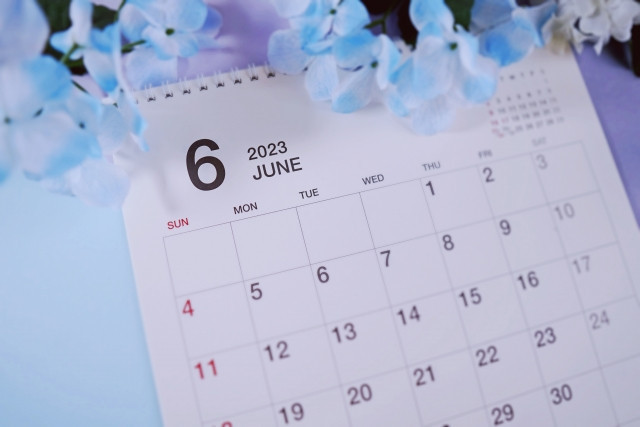
To start with, know the basic words for the calendar. In Japan, dates are written as 〇〇〇〇年〇〇月〇〇日 - 〇〇〇〇 Year 〇〇 Month 〇〇 Day.
When in 〇〇〇〇年〇〇月 form, the reading changes, for example May 2023 - 2023年5月 is read “ni-sen-nijuu-san-nen go-gatsu”.
|
ひ |
日 |
day |
|
しゅうかん |
週間 |
week |
|
しゅうまつ |
週末 |
weekend |
|
つき |
月 |
month; moon |
|
とし |
年 |
year; age (years old) |
Months
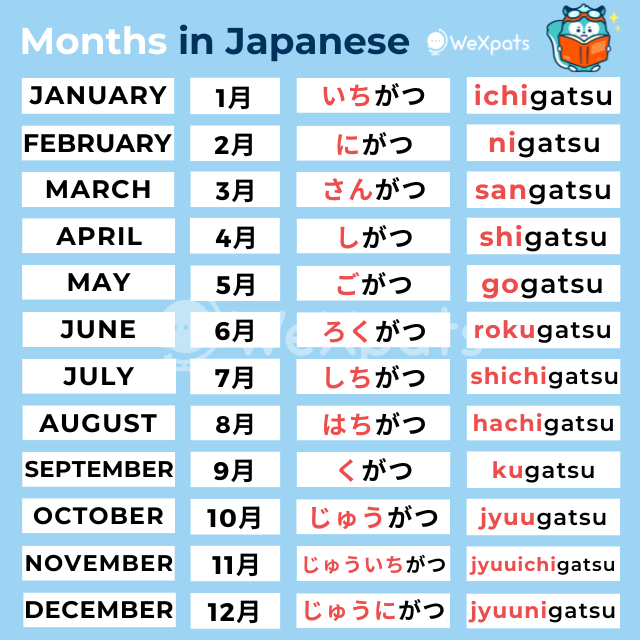
月 (tsuki) is read as (-gatsu) when used to name the months. 月 (-gatsu) can be written in Hiragana as well, eg. 一がつ, but for the sake of memorising the Kanji, let’s write it as 月. The numbers can also be written in numerical form like so - 2月.
|
いちがつ ichigatsu |
一月 |
January |
|
にがつ |
二月 |
February |
|
さんがつ |
三月 |
March |
|
しがつ |
四月 |
April |
|
ごがつ |
五月 |
May |
|
ろくがつ |
六月 |
June |
|
しちがつ |
七月 |
July |
|
はちがつ |
八月 |
August |
|
くがつ |
九月 |
September |
|
じゅうがつ |
十月 |
October |
|
じゅういちがつ |
十一月 |
November |
|
じゅうにがつ |
十二月 |
December |
Days of the Month
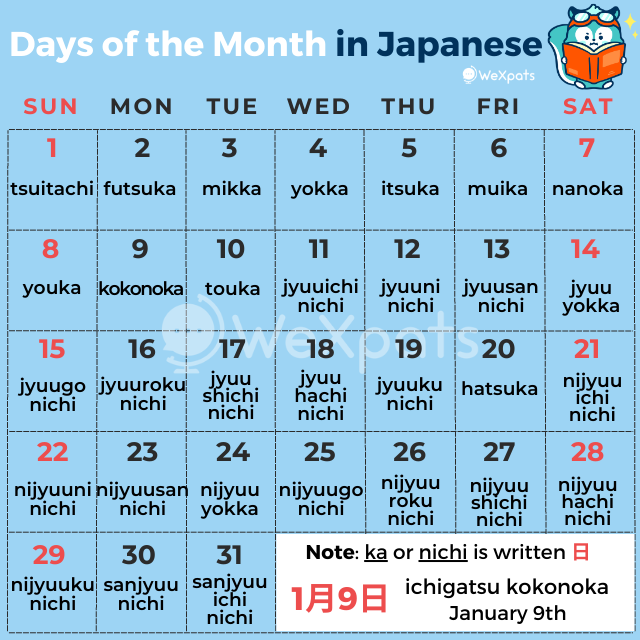
In Japanese, the first 10 days of the month and the 20th day of the month have special names. For example, the 1st day of the month is called 一日 (tsuitachi). This is surprising to many students who don’t have an equivalent word in their own language.
Moreover, 一日 can also be read as “ichinichi” but holds a completely different meaning - covered further down the article.
Note that only 一日 (tsuitachi) does not carry the meaning of “one day”.
|
ついたち |
一日 |
1st day of the month |
|
ふつか |
二日 |
2 days; 2nd of the month |
|
みっか |
三日 |
3 days; 3rd day of the month |
|
よっか |
四日 |
4 days; 4th day of the month |
|
いつか |
五日 |
5 days; 5th day of the month |
|
むいか |
六日 |
6 days; 6th day of the month |
|
なのか |
七日 |
7 days; 7th day of the month |
|
ようか |
八日 |
8 days; 8th day of the month |
|
ここのか |
九日 |
9 days; 9th day of the month |
|
とおか |
十日 |
10 days; 10th day of the month |
|
はつか |
二十日 |
20 days; 20th day of the month |
Days of a Week
These are the days of the week. Each day of the week in Japanese correlates with an element or planet.
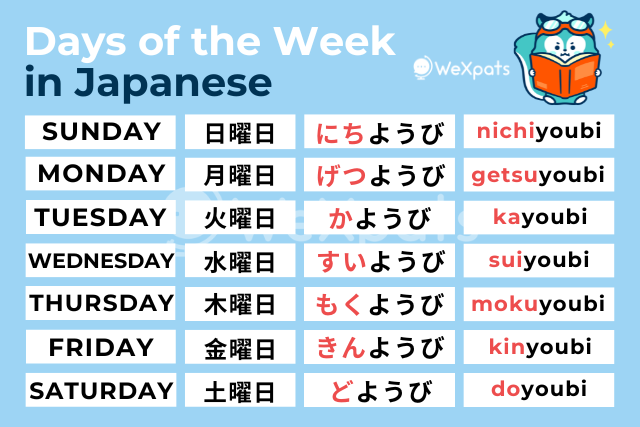
For example, 火曜日 - 火 is fire, 火星 is Mars; or 水曜日 - 水 is water, 水星 is Mercury.
|
げつようび |
月曜日 |
Monday |
|
かようび |
火曜日 |
Tuesday |
|
すいようび |
水曜日 |
Wednesday |
|
もくようび |
木曜日 |
Thursday |
|
きんようび |
金曜日 |
Friday |
|
どようび |
土曜日 |
Saturday |
|
にちようび |
日曜日 |
Sunday |
Time Period: Past, Present and Future Nouns
Nouns that describe a certain time period, for example next week, today, tomorrow, etc. To make it easier for you, we separated them according to day (日), week (週), month (月), and year (年).
The Kanji that are in BOLD need to be memorised at the N5 level.
By Day
|
おととい |
一昨日 |
day before yesterday |
|
きのう |
昨日 |
yesterday |
|
きょう |
今日 |
today |
|
あした |
明日 |
tomorrow |
|
あさって |
明後日 |
day after tomorrow |
|
まいにち |
毎日 |
every day |
|
さくばん |
昨晩 |
last evenight; last night |
|
ゆうべ |
昨夜 |
last night |
|
けさ |
今朝 |
this morning |
|
こんばん |
今晩 |
tonight |
|
まいあさ |
毎朝 |
every morning |
|
まいばん |
毎晩 |
every night |
By Week
|
せんしゅう |
先週 |
last week |
|
こんしゅう |
今週 |
this week |
|
らいしゅう |
来週 |
next week |
|
まいしゅう |
毎週 |
every week |
By Month
|
せんげつ sengetsu |
先月 |
last month |
|
こんげつ kongetsu |
今月 |
this month |
|
らいげつ raigetsu |
来月 |
next month |
|
まいつき maitsuki |
毎月 |
every month |
By Year
|
おととし |
一昨年 |
year before last |
|
きょねん |
去年 |
last year |
|
ことし |
今年 |
this year |
|
らいねん |
来年 |
next year |
|
さらいねん |
再来年 |
year after next |
|
まいとし |
毎年 |
every year |
Birthday & Age
Birthday or date of birth is called たんじょうび (tanjoubi) in Japanese. One would say, “わたしのたんじょうびは、三月七日です。(watashi no tanjoubi wa, sangatsu nanoka desu) - My birthday is on March 7th”.
Speaking of birthdays, you become a year older on your birthday, so how to say “I am 〇 years old” in Japanese? “わたしは5さいです。(watashi wa go-sai desu) - I am 5 years old”.
Age is shown by attaching 歳 / さい (sai) to the back of a number. The number is read as it is. The exception is 20 years old, which is not read “nijyuu-sai” but “hatachi”.
|
たんじょうび |
誕生日 |
birthday |
|
さい |
~歳 |
~ years old ; age |
|
はたち |
二十歳 |
20 years old |
N5 Nouns List - Time
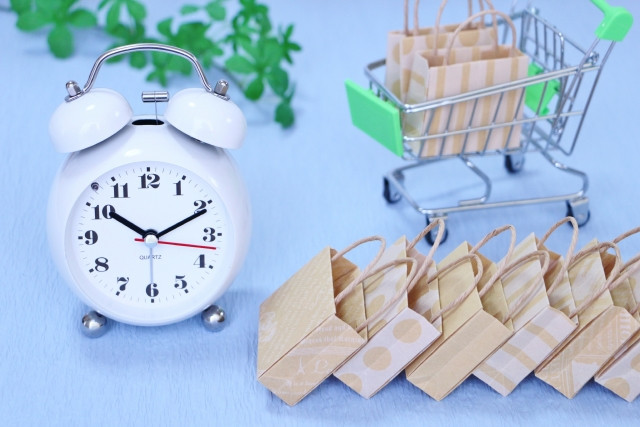
In this part, we will introduce nouns for telling the time.
If you notice in the chart below, 時 can be read as “toki” or “ji”, depending on when it is used.
For example, "時が来た。(toki ga kita) - The time has come." as compared to "今は15時30分です。(ima wa jyuugo-ji sanjyuuppun desu) - It is now 15:30pm."
Again, the BOLD kanji need to be memorised.
|
じかん |
時間 |
time |
|
とき |
時 |
time / o’clock |
|
ふん |
分 |
minute |
Moments in a Day
These are nouns to refer to a particular time of the day, like afternoon or evening.
|
ごご |
午後 |
afternoon; pm |
|
ごぜん |
午前 |
morning; am |
|
あさ |
朝 |
morning |
|
ひる |
昼 |
noon; midday |
|
ゆうがた |
夕方 |
evening |
|
よる |
夜 |
night |
|
ばん |
晩 |
evening; night |
|
いちにち |
一日 |
1 day; all day |
|
いま |
今 |
now |
|
あと |
後 |
behind; after; later; also |
Example Simple Sentences at N5 Level
A quick lesson on how to put these nouns to good use. The words we learnt are indicated in BOLD, try replaying the words with your own.
1. わたしは39さいです。
(watashi wa sanjyuukyuu sai desu)
- I am 39 years old.
2. あのひとは、せが高いですね。
(ano hito wa, se ga takai desu ne)
- That person is really tall isn’t he/she.
3. わたしのたんじょうびは、三月七日です。
(watashi no tanjoubi wa, sangatsu nanoka desu)
- My birthday is on March 7th.
4. 十日間のりょこうに行きます。
(toukakan no ryokou ni ikimasu)
- I am going on a trip for 10 days.
5. しゅうまつにゲームをやりたいです。
(shuumatu ni geemu wo yaritai desu)
- I want to play games on the weekend.
6. 来年はオリンピックがあります。
(rainen wa orinpikku ga arimasu)
- The Olympics is next year.
7. ビールを二つください。
(biiru wo futatsu kudasai)
- Two beers, please.
8. 土よう日に友だちとあいます。
(doyoubi ni tomodachi to aimasu)
- I am meeting a friend on Saturday.


































